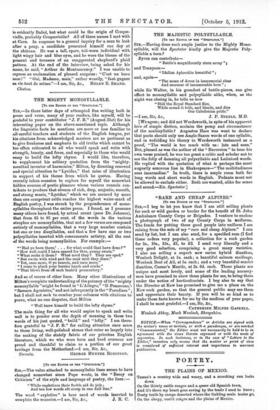THE MIGHTY MONOSYLLABLE.
[TO TEE EDITOR OF THE "SPECTATOR."] SIR,—In these latter days of attempted fine writing both in prose and verse, many of your readers, like myself, will be grateful to your contributor "J. F. R." (August 31st) for his interesting paper on the above-mentioned topic. Although the linguistic facts he mentions are more or less familiar to all careful teachers and students of the English tongue, yet
his citations from acknowledged masters are so pertinent as to give freshness and emphasis to old truths which cannot be too often reiterated to all who would speak and write with strength, beauty, and force, and especially to those who would essay to build the lofty rhyme. I would like, therefore, to supplement his solitary quotation from the "mighty- mouthed inventor of harmonies," Milton, by directing renewed and special attention to "Lycidas," that mine of illustration in support of his theme from which he quotes. Having recently taken occasion to explore for myself the somewhat hidden sources of poetic pleasure whose various runnels con- tribute to produce that stream of rich, deep, majestic, smooth, and strong music, "Lycidas," which we are assured by more than one competent critic reaches the highest water-mark of English poetry, I was struck by the preponderance of mono- syllables throughout the entire poem. I found, as I presume many others have found, by actual count (pace Dr. Johnson),
that from 65 to 85 per cent. of the words in the various strophes are monosyllables, that not a few verses are composed
entirely of monosyllables, that a very large number contain but one or two dissyllables, and that a few have one or two polysyllables inserted with consummate artistry, all the rest of the words being monosyllables. For example :—
"' Had ye been there,' . . . for what could that have done ? " "How well could I have spared for thee, young swain." "What reeks it them? What need they ? They are sped."
" But swoln with wind and the rank mist they draw." "Yet, once more, 0 ye laurels, and once more." " I come to pluck your berries harsh and crude." "That blows from off each beaked promontory."
And so of scores of other lines. Many other illustrations of Milton's complete understanding of the potency of the "mighty monosyllable "might be found in "L'Allegro," "Il Penseroso,', "Samson Agonistes," and not infrequently in the "Paradises but I shall not seek to cumber your columns with citations to prove, what no one disputes, that Milton " Well knew himself to build the lofty rhyme."
The main thing for all who would aspire to speak and write well is to ponder over the depth of meaning in those two words of his just quoted, " build " and "lofty." I am there- fore grateful to " J. F. R." for calling attention once more to those living, well-polished stones that enter so largely into the making of the stately fabric of our priceless English literature, which we who were born and bred overseas are proud and thankful to claim as a portion of our great heritage from the Motherland.—I am, Sir, &c.,
Toronto. GEORGE HUNTER ROBINSON.


































































 Previous page
Previous page